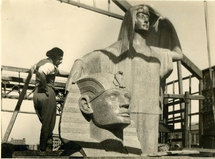Mass Egypt vote turnout marred by ElBaradei attack
Steve Kirby
CAIRO, Steve Kirby- Egyptians voted in huge numbers on Saturday in their first taste of democracy after Hosni Mubarak's ouster, although a referendum was marred by an assault on Nobel peace laureate Mohamed ElBaradei.
Turnout figures were not expected before Sunday but officials said the numbers at polling stations were unprecedented for Egypt, where participation was minuscule in the Mubarak era as voters assumed their ballots would make no difference.

AFP correspondents reported huge queues outside polling stations throughout the day from the Nile Delta to the Sinai peninsula, and from the Suez Canal to the capital.
Eager voters seized their first taste of democracy following president Mubarak's overthrow by nationwide street protests which ended decades of authoritarian rule.
"Today we feel our vote can make a difference," said pharmacy student Maraam Mohammed as she queued to vote in Cairo's twin city of Giza, site of the world-famous Pyramids.
One government official told AFP: "It's very difficult to get numbers but everyone agrees it's unprecedented, it's huge, it's never been seen before."
Arab League chief Amr Mussa, an Egyptian who is a leading contender for president in eventual elections, hailed the high participation as he cast his vote in upscale Garden City.
"Whether the Egyptian people say yes or no, that's alright," said Mussa, a staunch opponent of the transitional military government's plans to make only limited changes to the Mubarak-era constitution before holding new elections.
"What is important is that people are coming. We need a new Egypt."
The excitement of voters at casting their ballot, many of them for the first time in their lives, was overshadowed by an attack on former UN nuclear watchdog chief ElBaradei, who is a rival secular contender for the presidency, as he tried to cast his vote in south Cairo.
Despite being hit in the back by a stone thrown from a crowd of hundreds of Islamists, he escaped unharmed from the attack, his brother Ali said.
ElBaradei has been an outspoken critic of the tight timetable for the restoration of civilian rule set by the transitional military government, arguing that it gives far too little time for new political parties to organise at grass roots level.
An appointed panel of experts drew up the proposed amendments in just 10 days, as the military council that took over from Mubarak strives to hand over power as quickly as possible and keep the army above the political fray.
But the hasty, improvised nature of the proposed constitutional underpinnings of Egypt's promised new democracy drove many of the leading groups and figures behind the victorious protest movement to urge a "no" vote.
The amendments are by and large uncontroversial but critics argue that they do not go far enough in overhauling the Mubarak-era charter, which they say needs to be completely rewritten.
The president would serve a maximum of two four-year terms and the state of emergency that has governed Egyptian life for decades could only be imposed for six months without endorsement in a popular referendum.
The main advocates of a "yes" vote have been the Muslim Brotherhood -- powerful and well-organised despite being outlawed under Mubarak -- and elements of his former ruling National Democratic Party.
"This is a joyful day," Brotherhood leader Mohammed Badie said as he cast his vote in Manial, a middle-class Cairo neighbourhood, vowing to accept the verdict whatever it was.
"This time nobody can say in advance that the outcome of the vote will be this percentage or that."
But his movement came in for criticism from an Egyptian poll watchdog for bussing in "yes" voters and putting up campaign publicity around polling stations.
Outside a Cairo polling station, human rights lawyer Ragia Omran, who was monitoring the elections, was detained by the army and taken to the Cairo security directorate, The Front for Defense of Egypt Protesters said in a statement.
The count got under way straight after the close of polls. Assessments of the likely outcome have been as divided as views about the proposed changes.
Some analysts predict a majority "yes" vote, at least outside the big cities, given the strong rural support of the Brotherhood and the perceived backing of the army, popular after it sided with protesters against Mubarak.
Others are more sceptical, pointing to the widespread economic discontent in the provinces that has sparked a wave of strikes and walkouts.
---------------------------------------------------------------------------